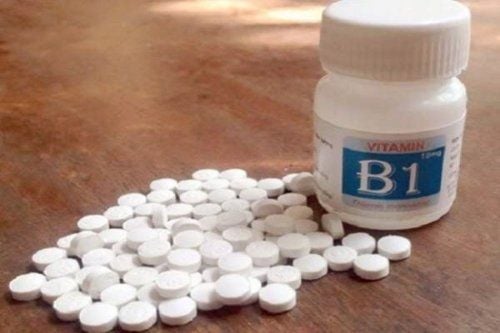This is an automatically translated article.
Article by Specialist Doctor I Le Tuyet Nga - Pediatrician - Vinmec Gardenia Clinic
Vitamin B1 deficiency disease, also known as Beriberi disease, is a disease that causes skin edema and can cause dangerous complications if not diagnosed and treated promptly. Taking preventive measures and maintaining a proper diet will reduce the risk of this disease.
1. What is vitamin B1 deficiency?
Vitamin B1 also known as thiamine, it is one of the 8 essential B vitamins that have many important functions in the body. This vitamin is used by most cells and is responsible for converting food into energy. Since the human body cannot produce thiamine, you must get this vitamin through a variety of thiamine-rich foods such as meat, nuts, and whole grains. If your diet is not full of these nutrients, it can lead to vitamin B1 deficiency (also known as beriberi). This is a edema disease caused by a deficiency of vitamin B1.
2. Causes of Beriberi and high-risk subjects
The main cause of Beriberi is a diet deficient in Thiamin. This disease is common in areas where people have a habit of eating too much milled rice or rice that only contains about 1/10th the amount of Thiamin compared to normal white rice such as brown rice.
In addition, other possible causes of thiamin deficiency include:
Infants fed formula containing low levels of thiamin. Children with prolonged diarrhea easily lead to thiamin deficiency. Children with genetic beriberi: This is a very rare case when the body cannot absorb thiamin from food. Pregnant women, lactating mothers with a diet poor in thiamin. People with hyperthyroidism. Alcoholics: The body of alcoholics will find it difficult to absorb and store thiamin, thereby causing a deficiency. The use of diuretics also leads to thiamine deficiency. In addition, patients on dialysis are also at high risk of beriberi, due to a lack of thiamine stores in the body.
3. What are the signs and symptoms of vitamin B1 deficiency?
Common symptoms of vitamin B1 deficiency are:
Rapid weight loss. Anorexia. Colitis . Digestive problems occur constantly such as diarrhea. Nerve damage. Burning in the feet (especially severe at night). Neuritis. Fatigue and low energy. Temporary memory loss. Confused. Uncomfortable. Muscle weakness, muscle wear, cramps, pain in the legs and spasticity. Mental changes such as apathy or depression. Cardiovascular effects such as an enlarged heart. The brain, heart, tissues and many other organs are affected by low vitamin B1 levels. High concentrations of vitamin B1 are commonly found in the muscles, bones, heart, liver, kidneys, and brain. So what disease does vitamin B1 deficiency cause? In fact, this vitamin deficiency causes degeneration of peripheral nerves and parts of the brain, including the thalamus and cerebellum. In addition, deficiency can also reduce blood flow, cause vascular resistance, edema, and relax the heart muscle.
Symptoms of vitamin B1 deficiency disease (Beriberi disease) are initially silent, unknown, so they are often ignored. The patient only feels tired, the legs get tired quickly and there is a feeling of heaviness in the calves. In the evening, the legs are slightly swollen in the ankle area and numb, there is a tingling feeling like ants crawling in the calf, or cramps, sometimes the heart beats nervously. If left untreated, the disease will get worse.

Triệu chứng thiếu vitamin B1 phổ biến là chán ăn
4. Degree of vitamin B1 deficiency disease
Beriberi disease is divided into 3 levels, specifically:
Mild: The patient has recently lost or decreased sensation, decreased reflexes, mainly in the lower extremities. At this time, if treated, the disease will heal quickly. Moderate: Patient has loss of sensation, loss of tendon reflexes, myasthenia gravis, difficulty walking but no muscle atrophy or unknown muscle atrophy. In severe degree: The patient has edema of the entire lower extremities, loss of tendon reflexes, loss of sensation, muscle atrophy, unable to walk, possibly death from heart failure, especially in children.
5. Symptoms of Beriberi depend on the type of disease
In severe cases, Beriberi disease is often associated with Wernicke-Korsakoff syndrome. Wernicke encephalopathy and Korsakoff syndrome are two forms of brain damage caused by thiamin deficiency. Wernicke encephalopathy affects several sites in the brain such as the hypothalamus. The disease can cause confusion, memory loss, loss of muscle coordination, and vision problems such as rapid eye movement and double vision. Korsakoff syndrome is the result of permanent damage to certain areas of the brain that are responsible for storing memories. People with this syndrome often have memory loss, the inability to form new memories, and hallucinations.
MORE: Vitamin B1 deficiency polyneuritis
6. Diagnosis of vitamin B1 deficiency disease
Doctors need a series of medical tests to determine if a person has a vitamin B1 deficiency. Blood and urine tests measure the amount of vitamin B1 in the body. If the body has difficulty absorbing this vitamin, levels will be low in the blood and high in the urine.
The doctors will also perform brain function tests to determine if the patient has lack of coordination, difficulty walking, degree of eyelid drooping and weak reflexes. . People with late-stage vitamin B1 deficiency present with memory loss, confusion, or delusional states.
Regular checkups with your doctor help alert you to any heart problems. Fast heart rate, lower leg swelling, and shortness of breath are all symptoms of vitamin B1 deficiency.
7. Treatment of vitamin B1 deficiency
Vitamin B1 deficiency is easily treated with this vitamin supplement. Your doctor may prescribe vitamin B1 injections or pills. For severe cases, doctors will treat vitamin B1 intravenously.
Treatment progress will be monitored with blood tests to see how well the body is absorbing the vitamin.

Thiếu vitamin B1 được điều trị bằng cách bổ sung thuốc viên vitamin B1
8. How to prevent vitamin B1 deficiency
A healthy and balanced diet that includes foods rich in thiamin is the best preventive measure against vitamin B1 deficiency including:
Giving your child a healthy, balanced diet including: foods rich in vitamin B1 such as beans and legumes, nuts, meat, fish, whole grains, nuts, dairy products. If you're formula-feeding your baby, you should also check to see if they contain enough vitamin B1. Always make sure to buy infant formula from a trusted source. Many grain products contain 100% of the daily recommended vitamin needs. Pregnant and nursing women should be screened for vitamin deficiency periodically. Infant formula products should be supplemented with Thiamin requirements as recommended. Limiting the use of alcoholic beverages also reduces the risk of Beriberi. Alcoholics should also be screened for vitamin B1 deficiency regularly. Vitamin B1 deficiency disease, if diagnosed and treated promptly, can fully recover. The neurological and cardiovascular damage caused by Beriberi is curable if detected early.
If the disease progresses to the stage of Wernicke-Korsakoff syndrome, the outlook for treatment is lower. Although treatment can control the symptoms of Wernicke encephalopathy, the damage to the brain from Korsakoff syndrome is usually permanent.
Maintaining a healthy, balanced diet is important for good health, so let your doctor know if you suspect you have signs of a vitamin B1 deficiency or In case you need advice on your own nutrition.
With young children, when vitamin B1 deficiency is common, children often have anorexia, making them less able to absorb and slow to develop. Vitamin B1 deficiency can cause dangerous complications for children's health and mental health, so parents need to observe and timely supplement this important source of vitamin. In addition to dietary supplements, parents can give their children supportive foods containing vitamin B1 and essential micro-minerals such as zinc, lysine, chromium, selenium, ... to help fully meet their needs. nutritional requirements in children. At the same time, these essential vitamins also support digestion, enhance nutrient absorption, help improve anorexia, and help children eat well.
Please regularly visit Vinmec.com website and update useful information to take care of the whole family.













